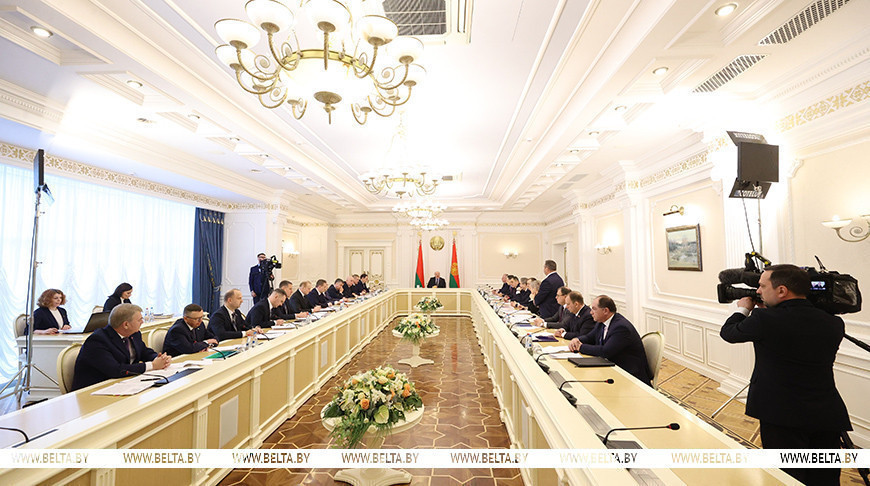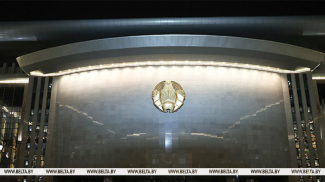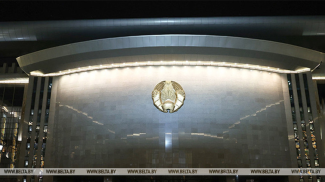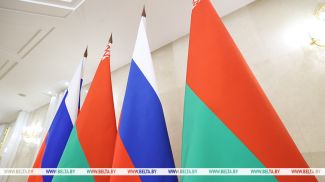
MINSK, 12 March (BelTA) – It is necessary to intensively and effectively exploit deposits, extract and process mineral resources. Belarus President Aleksandr Lukashenko identified the task during a government conference held on 12 March to discuss the state and development of the country’s mining industry, geological exploration work, including work targeting hydrocarbon raw materials, BelTA has learned.
On the whole, about 50 kinds of mineral resources have been discovered in Belarus. The country is in Europe’s top 10 in terms of their availability. However, Aleksandr Lukashenko is against self-complacency. This is why he hosted the conference to review what the problems are and where it is necessary to step up efforts.
“Time has come to compare notes. And find solutions to the most problematic issues you have not worked on sufficiently enough. There are plenty of those. Although it stands to reason that we have rather successful industries,” the head of state said.
The state of the stock of mineral resources and its further development were already discussed at a similar government conference eight years ago. Instructions were also given when Andrei Khudyk was appointed natural resources and environmental protection minister in 2017. “Back then you and I said that Belarus’ natural riches on the surface have been studied rather well. But we don’t know everything about the subsurface resources. This is why it is necessary to step up geological prospecting,” the head of state said.

The president emphasized the significance of domestic mineral resources and raw materials because sovereignty and the stable development of the economy depend on them. It is particularly topical now in the face of the sanctions-fueled pressure.
However, not only natural resources were on the agenda. Since heads of all the regions were present, participants of the conference discussed the beginning of spring field works: the state of winter crops, soil cultivation, sowing, examination of vehicles and machines. Deputy Prime Minister Leonid Zayats presented a detailed report on the matters.
Another agricultural matter that the president constantly monitors is the animal husbandry industry and, in particular, young animals and the loss of cattle. Sales of agricultural products were also discussed as well as possible problems with sales and the operation of the retail industry. Attention was drawn to services available in small communities and to rural Belarusians – to the matters that Aleksandr Lukashenko had raised at a recent meeting with representatives of the Belarusian National Union of Consumer Societies.
Roads and beautification were also mentioned as traditional tasks for early spring. Aleksandr Lukashenko repeated his instruction to put in order and repair all the motorways in the country by 9 May. Municipal councils of deputies, new members of which had been recently elected, will act as some of the agencies in charge of overseeing the beautification work.

“I don’t believe it”. How much oil is extracted in Belarus now? Why is Aleksandr Lukashenko not satisfied with the figures?
The first thing the president pointed out at the beginning of the meeting is how much oil was extracted in Belarus in the USSR times: about 8 million tonnes per annum or about 9 million tonnes according to some sources. The specialists, who were present at the conference, confirmed the figures. This is why the head of state reasonably wondered why the oil extraction volume had dropped so significantly and what options are available for increasing it.
“Everyone knows the natural and geological conditions in Belarus. We used to extract 9 million tonnes. Let’s say 8 million tonnes. Today we extract approximately 2 million tonnes as well as associated gas and the rest. What is the problem? I am getting explanations that the oil reserves have been depleted. I don’t believe it,” Aleksandr Lukashenko said.
It was noted that Belorusneft enjoys a monopoly in the country’s oil industry. The company truly works quite well and boasts advanced competences. However, an alternative evaluation of the state of affairs in this field was necessary. Particularly with regard to prospecting for new commercial oil reserves.
Specialists note that reserves and the potential are available and the annual increase in discovered reserves confirms it. No, not all the reserves are easy to recover or economically expedient to extract taking into account the geological conditions of where this oil is. Extracting this oil to the detriment of the company is not the idea. The main task is to work better. It is necessary to thoughtfully look for new oil deposits wherever possible and allocate the necessary resources. All the more so because neighboring countries, in particular, Russia explore and extract oil in similar conditions after all. It is important for everyone to work hard and to do one’s best for it.

“We have to use what we have wisely and in a businesslike manner. We have to look for what we don’t have but intend to have,” the president stressed. “If we could extract 5 million tonnes of oil instead of 2 million, we would be a rich country. This is why we are looking into the problem.” Aleksandr Lukashenko believes it is even more topical to use the domestic raw materials now in view of the ever-increasing pressure of sanctions against Belarus.
The head of state said: “I am told that as of today the commercial reserves of Belarusian oil make up about 45 million tonnes. In 2016-2023 the reserves grew by 14 million tonnes, including by 2.5 million tonnes in 2023 alone. It is a record high of the last 40 years. It means there is something there. The application of new technologies, an increase in seismic exploration and drilling have allowed increasing oil extraction by 20,000 tonnes per annum on the average since 2017.”
However, Aleksandr Lukashenko believes the growth rate is insufficient and wants a comprehensive approach to the matter. “What are the prospects of developing the wells and what are we going to do about hard-to-recover resources? How many years forward do the geological exploration plans cover? Do you have enough domestic specialists and equipment?” the president formulated a number of questions.
“I repeat once again: go and look for what the country needs,” Aleksandr Lukashenko said.
Extraction of mineral resources without the ministry’s oversight
Speaking about the development of the country’s stock of mineral resources, the head of state mentioned both positive examples and a number of uncovered shortcomings that corresponding officials have to address.
According to the president, Belaruskali’s performance deserves praise. The company has become an internationally recognized brand. The company’s business processes are finely tuned starting with prospecting for new deposits and ending with fertilizer production.
Aleksandr Lukashenko criticized the development of mineral deposits in the country due to the lack of unified oversight.

The president noted that the government claims that the state program on environmental protection and sustainable use of natural resources for the 2016-2020 period had been successfully implemented. The next program is in the pipeline.
“Meanwhile, there is no unified oversight over the development of deposits. At present many agencies have the right to exploit subsurface resources. And naturally each of them caters only to its own interests,” the head of state said and urged to take measures to mend the situation.
For instance, road construction workers need sand. So, they extract only sand from an open pit. Civil engineering companies need road metal. Energy companies need peat. But it is unclear who evaluates the situation and decides whether it is necessary to extract accompanying mineral resources if, for instance, there is basalt under peat. “Why doesn’t the Natural Resources and Environmental Protection Ministry play its oversight role? I know that you were given the relevant instruction more than a year ago. What has changed since then?” Aleksandr Lukashenko asked officials.
Mineral resources are mined and extracted all over Belarus. “Oversight agencies report that open pits are often used and recultivated with violations,” the head of state pointed out. “They attribute it to insufficient interaction between users of subsurface resources and municipal authorities. They are mired in bureaucracy, endless reconciliations, expert evaluations where those are not necessary or not. It is detrimental to business. I’ve specifically instructed to invite all the oblast governors here so that nobody would have more questions about how we should work in the future.”

Pick up the resources under your feet instead of paying for imports without complaints
As another problem that needs to be promptly addressed the president mentioned the insufficient utilization of the production capacity for extracting and mining Belarusian raw materials. The government registered the following utilization rates in 2018-2023: glass and molding sands - 39%, refractory clays - 47%, chalk, marl, clay and tripoli for cement - 53%, dolomite - 38%, facing stone - 44%.
“We have to utilize virtually 100% for every resource if we have created these capacities. We are underperforming by half!” the president criticized. “Meanwhile, despite the availability of sufficient raw materials in the country, over the past year we imported almost 300,000 tonnes of pebble stones, gravel, crushed stone. The things that we have. More than $18 million was spent. 50,000 tonnes of natural sands was purchased for almost $5 million. These are huge numbers.”
“Prices for mineral resources grow higher year after year. Instead of taking measures and making use of what is literally under our feet, we pay without complaints,” Aleksandr Lukashenko pointed out.
The president cited a concrete example concerning clay purchases. Belarus imports this raw material instead of developing the domestic deposits.
The glass industry does not have all the silica sand it needs, the head of state continued. At the same time the reserves that have been prospected so far can solve the problem for two years right away. There is a bunch of examples of insufficiently good logistic schemes.
“And what do we have as a result? Underperforming manufacturing facilities and the reduction of the output. In turn, they drag down the other indicators,” the president stated and cited some fresh data concerning several imports. In 2023 enterprises run by the Architecture and Construction Ministry reduced the export of road metal by a quarter. The Energy Ministry reduced the export of peat products by nearly half. “Understandably, they lost earnings as well. Everyone blames it on sanctions. There are no sanctions for you. Look for other markets,” the head of state gave the instruction.

The president also pointed out shortcomings in the operation of the applied science center for geology. The enterprise takes care of prospecting for all kinds of minerals. “The State Control Committee says that the production assets of the enterprise have deteriorated by 90%,” Aleksandr Lukashenko said. By the way, as he analyzes the performance of entire industries and enterprises, the president manages to notice even such seemingly minor details. In this case he was critical of the State Control Committee’s evaluation of the deterioration rate of the geology center’s production assets. He wondered how the committee had calculated the percentage and why it equals 90% instead of 88%.
“In 2022 I decided in favor of enhancing this physical infrastructure. As many as 21 units of modern vehicles, machines, and equipment were bought over the course of two years. What is the result?” the head of state continued.
Aleksandr Lukashenko also addressed a specific question to the National Academy of Sciences of Belarus about ways to improve geological exploration: “Do scientists have new methods, programs, and breakthrough technologies?”

Three whales: effectiveness, import substitution, export
“Our common goal is not only to make products while using as many domestic raw materials as possible. There are three whales, three growth drivers that will enable us to continue developing. Those are effectiveness, import substitution, and export,” the president said.
The head of state drew attention to the need to prevent unwarranted brokerage and import of the kinds of products that are already made in Belarus.
Aleksandr Lukashenko urged to step up the quality of work: “Let’s agree that all the approaches to quality of work should be revised in the Year of Quality. If there are systemic problems that require my interference, tell me about them. Decisions will be made right away.”
“There are no topics of secondary importance in economy and there can be none because the country’s sovereignty and the nation’s wellbeing depend on the stability of the economy. It is the most important thing,” the president concluded.













